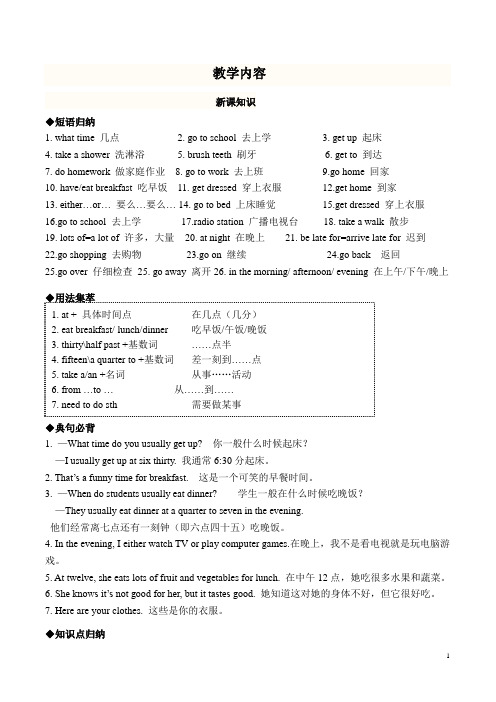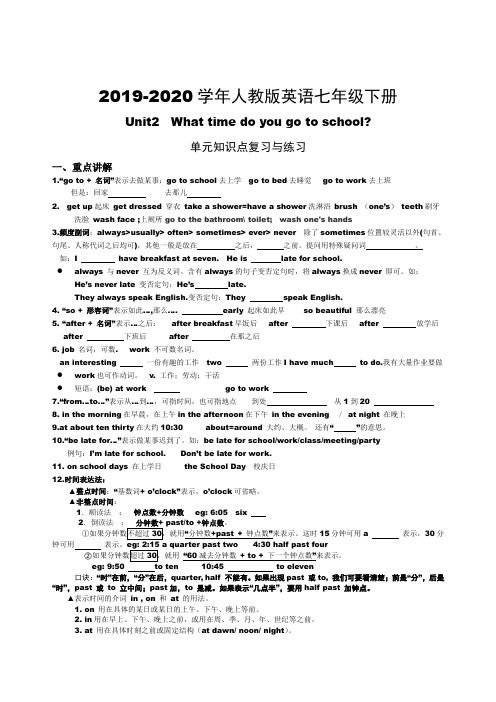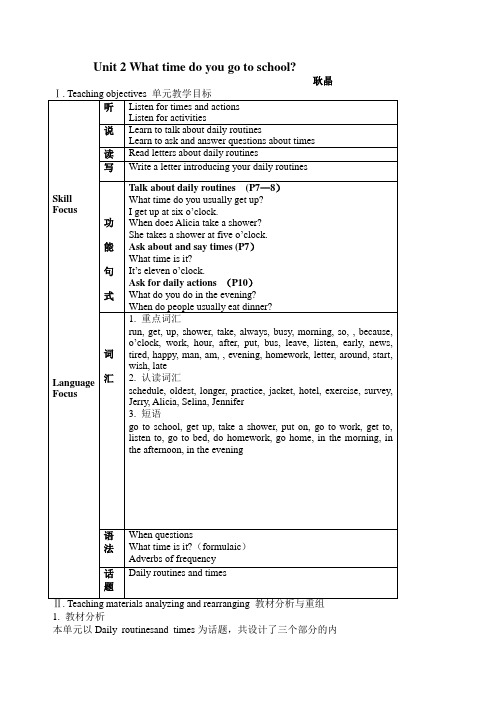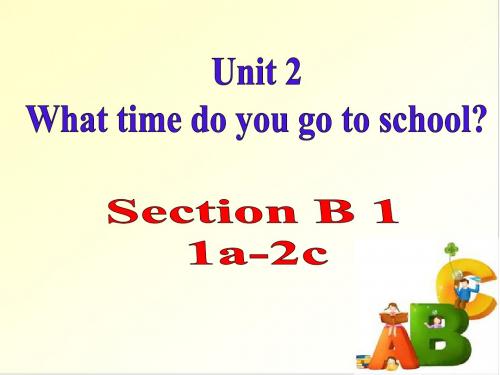七年级英语下册_Unit_2_What_time_do_you_go_to_school(Section_B_1a-3c)课件_(2012新版)人教新目标版
七年级英语下册_Unit2_what_time_do_you_go_to_school知识点__练习和答案

教学内容新课知识◆短语归纳1. what time 几点2. go to school 去上学3. get up 起床4. take a shower 洗淋浴5. brush teeth 刷牙6. get to 到达7. do homework 做家庭作业8. go to work 去上班9.go home 回家10. have/eat breakfast 吃早饭11. get dressed 穿上衣服12.get home 到家13. either…or… 要么…要么… 14. go to bed 上床睡觉15.get dressed 穿上衣服16.go to school 去上学17.radio station 广播电视台18. take a walk 散步19. lots of=a lot of 许多,大量20. at night 在晚上21. be late for=arrive late for 迟到22.go shopping 去购物23.go on 继续24.go back 返回25.go over 仔细检查25. go away 离开26. in the morning/ afternoon/ evening 在上午/下午/晚上◆用法集萃1. at + 具体时间点在几点(几分)2. eat breakfast/ lunch/dinner 吃早饭/午饭/晚饭3. thirty\half past +基数词……点半4. fifteen\a quarter to +基数词差一刻到……点5. take a/an +名词从事……活动6. from …to … 从……到……7. need to do sth 需要做某事◆典句必背1. —What time do you usually get up? 你一般什么时候起床?—I usually get up at six thirty. 我通常6:30分起床。
英语七年级下册语法Unit2What-time-do-you-go-to-school

Unit 2 What time do you go to school ? 一.What time 什么时候,几点钟。
常用于对具体的(确切的)时间提问,也可用when来替换,但反之不一定行。
1. What time/ When do you get up in the morning?I get up at six o’clock in the morning.2. What time is it ? / What’s the time ?It’s six-thirty. / It’s half past six.二.★关于时间的表达法:顺读法,逆读法。
1. 顺读法:按汉语的习惯,先说点后说分的方法。
结构:点+分。
5:10 five-ten 8:30 eight-thirty9:46 nine forty-six 1:05 one-five整点的读法:基数词+o’clock7:00 seven o’clock 12:00 twelve o’clock2. 逆读法:借助介词past或to, 先说分后说点的方法,其结构为:分+past/to +点past 过to 差①当分钟数小于或等于30分钟时,用介词past表示。
7:05 five past seven 6:30 thirty past six =half past six30 thirty=half an hour 11:25②当分钟数大于30时,用介词to表示:几点差几分。
其结构为:(60-分)+to +(点+1)11:50 ten to twelve 9:45 fifteen to ten =a quarter to ten7:55 3:35hour 小时minute 分second 秒quarter 一刻钟写出同义句:seven thirty = ____ ____ seven eight forty = ____ ______ nine 三.★感叹句What a funny time to eat breakfast !What a lucky guy!定义:表示喜怒哀乐等强烈感情的句子叫感叹句。
2019-2020年人教版英语七年级下册 Unit2 What time do you go to

2019-2020学年人教版英语七年级下册Unit2 What time do you go to school?单元知识点复习与练习一、重点讲解1.“go to + 名词”表示去做某事:go to school去上学go to bed去睡觉go to work去上班但是:回家去那儿2. get up起床get dressed 穿衣take a shower=have a shower洗淋浴brush (one’s)teeth刷牙洗脸wash face ;上厕所 go to the bathroom\ toilet; wash one's hands3.频度副词:always>usually> often> sometimes> ever> never 除了sometimes位置较灵活以外(句首、句尾、人称代词之后均可),其他一般是放在之后,之前。
提问用特殊疑问词。
如:I have breakfast at seven. He is late for school.●always 与never 互为反义词。
含有always的句子变否定句时,将always换成never 即可。
如:He’s never late 变否定句:He’s late.They always speak English.变否定句:They speak English.4. “so + 形容词”表示如此…,那么…. early 起床如此早so beautiful 那么漂亮5. “after + 名词”表示…之后:after breakfast早饭后after 下课后after 放学后after 下班后after 在那之后6. job 名词,可数. work 不可数名词。
an interesting 一份有趣的工作two 两份工作I have much to do.我有大量作业要做●work也可作动词。
七下Unit_2_What_time_do_you_go_to_school

3a
Write answers or questions. Use always, usually or never.
1.What time do you get up on school days?
I usually get up at 5:30 on school days. _______________________________
6:30
2a
Listen to the conversation and complete the sentences.
two two Jim has _____brothers and ____sisters. Jim’s only shower. family has ________ one
What time is it
2. I eat dinner at 6:30. (对划线部分提问)
What time do you eat dinner _____________________________?
3.I usually go to bed at nine o’clock.(对划线部分提 问)
eat breakfast
6:20
What time do you usually eat breakfast?
I usually eat breakfast at 6:20.
play basketball
What time do you usually play basketball?
I usually play basketball at 7:00.
I always get up at 6:20. I never eat breakfast. I usually get up at 5:30 o’clock.
七年级新目标下Unit_2_What_time_do_you_go_to_school教案

Unit 2 What time do you go to school?耿晶1. 教材分析本单元以Daily routinesand times为话题,共设计了三个部分的内容。
旨在通过单元教学使学生学会谈论日常行为、询问并答复有关时间的问题、询问并回答人们在特定时间所从事的活动。
Section A 学习谈论日常作息时间。
1a, 1b, 1c 重点学习和学生息息相关的几种日常行为的英文表示方法,学会询问和答复日常作息时间。
2a, 2b, 2c ,2d继续学习谈论自己或他人的日常作息时间。
重点学习如何询问,这也是本单元的语法重点。
3a, 3b, 3c 学会叙述他人的日常活动安排,同时学习询问时间和时间表达法,进一步巩固询问别人的日常作息时间的表达法。
Section B 继续学习询问和谈论别人的日常行为。
1a, 1b, 2a, 1c,1d,1e,学会谈论和询问一天内各个时间段的活动安排。
2a,2b,3a,3b学会通过两个人的对比介绍来判断并养成好的作息时间。
Self check 重点单词句型复习2. 课型设计与课时分配Period 1 Listening and speaking (I)(Section A: 1a, 1b, 1c)Period 2 Listening and speaking (II)(Section A:2a, 2b, 2c,2d)Period 3 Integrating skills(Section A:3a, 3b, 3cSection B: 1a, 1b,1c,1d,1e)Period 4 Reading and writing(Section B:2a, 2b, 2c,3a,3b)Period 5 Self checkⅢ. Teaching plans for each periodPeriod 1 Listening and speaking(Ⅰ) Target language目标语言1. Words && phrases生词和短语Up,get up,dress,get dressed,brush,tooth,shower,take a shower,usually,forty, what time,2. Key sentences重点句子When do people usually ...? People usually ...What time do you usually ...? I usually ...Ability goals能力目标Enable students to learn to talk about daily routines.Learning ability goals学能目标Help the students learn how to talk about daily routines.Teaching important / difficult points教学重难点How to talk about daily routines.Teaching aids教具准备A tape recorder and a model clock.Teaching procedures and ways教学过程与方式Step ⅠWarming upIn this procedure, motivate students to learn some words and phrases by singing the songs they’ve learned before.T: Good morning, everyone. (sing) “Good morning to you. Good morning to you. Good morning, dear children. Good morning to you.” This song is easy to learn. Who can sing it to us?Encourage students to sing the song.T: Well done. Thank you! We sing “Good morning to you” in the morning. Then what do we sing in the afternoon and in the evening? S: We sing Good afternoon to you in the afternoon and Good evening to you in the evening.T: That’s right. I know all of you are very good at singing. Does anyone want to sing Good afternoon to you or Good evening to you to us?Step ⅡTalking and reading (1a)In this procedure, ask students to finish the required task and learn some key phrases about daily actions.T: As we all know, time is very important and in English there is a famous saying "An hour in the morning is worth two in the evening." So what do you do in the morning?S1: I read English. S2: I do morning exercise.T: And what do you do in the afternoon and in the evening?S1: I play basketball in the afternoon. S2: I watch TV in the evening.T: I’m very glad to hear that. You use your time very well. And there’re many daily things we can do. Now let’s read these phrases in 1a and match these actions and the time of day.Step ⅢPracticeIn this procedure, students will learn how to talk about actions and the time of day.T: I know you’re very clever. Now I want you to tell if my statements are right or wrong. First, I usually eat dinner in the morning. S: Wrong.T: When do I usually eat dinner? S: In the evening.T: Second, she gets up at 19:00 in the morning. S: Wrong.T: What is the correct way of saying the sentence? S: She gets up at 7:00 in the morning.T: How clever you are! Now let’s read the conversation in groups and see which group reads better.Ask students to do pairwork.T: Please ask your partner when people usually do these things: do homework, eat dinner, eat breakfast and go to bed.(Write “When do people usually ...”on the blackboard)Sample dialogue:S1: When do people usually do homework?S2: People usually do homework in the afternoon.Interest the students in going on practicing the conversation using a new way of reading.T: Now let’s try a new way of reading. First I name one student to ask a question, and then ask all of you repeat this question together. After that, I name another student to answer this question, and all of you repeat the answer together.Sample dialogue:S1: When do people usually go to bed?S: When do people usually go to bed?S2: People usually go to bed in the evening.S: People usually go to bed in the evening.Step ⅣTalking about time (1c)In this procedure, students will learn how to ask about and say hour times and learn some key phrases about daily routines.T: Boys and girls, please listen to what I’m saying and guess what it is. 小小骏马不停蹄,日日夜夜不休息,蹄声哒哒似战鼓,提醒人们争朝夕。
2014人教版七年级英语下册Unit_2_What_time_do_you_go_to_school知识点总结

Unit 2 What time do you go to school?一、知识点总结()1.--What's the time? --______one-thirty.A. ItsB.It'sC.This isD.They're()2.--______ do you usually go to bed?--At six.A. What timeB.How timeC.WhenD.A and C()3. When ______ Tom take a shower?A. doesB. doC. has4. Alicia takes a shower at 9:00.(提问划线部分)______________________________________?5. She often runs in the morning.(对划线部分提问) ________ _________ she often_________?()6. 8:30 am means (意思是)___________.A. half past eight in the morningB. half to eight in the morningC. half past eight in the afternoon7. What time ______ he usually ______(go) to bed?1,What time/when do you get up?What time/when +助动词do/does +主语+动词原形,询问某人做某事的具体时间。
what time do you begin class in the morning?注:What’s the time=What time is it?也是用来询问时间,意为“几点了”。
用it作答。
What’s the time? It’s 7:30.(顺读法、逆读法)()1. Zhang Min usually gets up _______.A. at six thirtyB.at thirty sixC.on six thirtyD.on thirty six()2. -----What time is it ?------It’s ______ 7:00. We often have breakfast ____7:00A. at, atB. /, atC. at, /2.I usually get up at five o'clock.on,at,in这三个常用介词都可以表示时间和地点,但具体用法不同.①on用在日期、星期几、节日前,也表示在具体某一天及具体某一天的上午、下午和晚上。
初一下_unit_2__What_time_dou_you_go_to_school_____Section_B_...

In the evening does her homework, swims or takes a walk At nine thirty
2c Write down the unhealthy habits of each person. Then think of healthy activities for them.
1c Listen and circle the activities
quickly adv. 很快地 either adv. 或者;也(用在否定 词组后) either…or… 要么……要么……; 或者……或者…… lot pron. 大量;许多 lots of 大量;许多
sometimes adv. 有时;间或 taste v. 有……的味道;品尝 n. 味道;滋味 life n. (pl. lives)生活;生命
half
half past nine quarter a quarter to twelve
a quarter past seven A.M. in the morning
P.M. in the afternoon
do homework
go to bed
run
walk
take a walk
clean the room
1) be good for …表示“对……有益;
对……有好处”; be bad for…表示“对……有害; 对……有坏处”。
2) taste 意为“尝起来……”。是连系动 词,后面常跟形容词作表语。学法p13 苹果尝起来味道很好。 Apples taste good. 冰淇淋的味道尝起来很好吗?
Read 2b again and fill in the blanks.
七下Unit_2B_what_time_do_you_go_to_school

B. at
C. on
( B) 2. You run at six_____ the morning.
A. at
B. in
C. on
( C) 3. He can do _____ homework by himself.
A. her
B. him
C. his
( A) 4. Don’t speak! Listen _____ the teacher. A. to B. in C. at
...
B:
get up
6:00
I
take a shower
at …
eat breakfast …
How to tell the time in English?
9:10 10:15 11:20 12:30 13:40 14:45 15:56 nine ten/ ten past nine ten fifteen/a quarter past ten eleven twenty/twenty past eleven twelve thirty/half past twelve one forty pm./twenty to two two forty-five/a quarter to three pm. three fifty-six pm./ four to four pm.
_________ at nine thirty. My life isn’t exciting. go to bed
翻译:
1. 谢谢你的帮助。
Thanks for your help. /Thank you for your help.
Can you tell me about your teacher?
- 1、下载文档前请自行甄别文档内容的完整性,平台不提供额外的编辑、内容补充、找答案等附加服务。
- 2、"仅部分预览"的文档,不可在线预览部分如存在完整性等问题,可反馈申请退款(可完整预览的文档不适用该条件!)。
- 3、如文档侵犯您的权益,请联系客服反馈,我们会尽快为您处理(人工客服工作时间:9:00-18:30)。
n.&pron. 一半;半数 prep. 晚于;过(时间) adj. 过去的 n. 一刻钟;四分之一 quarter n. 家庭作业 homework do (one’s) homework 做作业 half past
run v. 跑;奔 clean v. 打扫;弄干净 adj. 干净的 walk n.&v. 行走;步行 take a walk 散步;走一走
2)taste表示“吃上去;吃起来;品尝”, 与我们学过的That sounds good.和It looks nice.中的sound和look的用法同 属一类,之后要用形容词。 其他表示感觉的系动词还有smell(闻起 来)和feel(摸上去)。如: This fish smells delicious. 这条鱼闻起来真香。 Its skin feels really smooth. 它的皮摸起来真光滑。
1aWhen do students usually do these
things? Match the activities with the time of day.
3
1
2
4
1b
Pairwork
Check your answers with your partner. Do you agree?
Tony
Healthy activities
get up early
get up late
have breakfast quickly have breakfast slowly Don’t usually eat usually eat hamburgers hamburgers eat ice-cream after Don’t eat ice-cream Mary dinner after dinner
Design a survey to find out what your classmates do on weekends.
1.They usually eat dinner at a quarter to seven in the evening. 他们通常晚上六点四十五分吃晚饭 。 英语钟点时刻的表达方式: 1)采用基数词直接表达时间,例如: six thirty 六点半; eight fifteen 八点十五分 nine fifty-five 九点五十五分
Unit 2 What time do you go to school?
Section B
Period One
-- What time do you usually…? -- I usually … at …
get up?
run? -- What time do you usually take a shower? have breakfast? go to school? get up at 6:00 run at 6:30 -- I usually take a shower at 7:00 have breakfast at 7:30 go to school at 8:00
3)AM和PM
AM表示“午前,上午”(午夜12:00后
至中午12:00前);PM表示“午后,下
午” (中午12:00后至午夜12:00前)。在 使用中,常用小写形式,am和pm。在 美式英语中,实用形式为a.m.和p.m.
2. In the evening, I either watch TV or play computer games. 晚上我要么看电视要么玩电脑游戏。 either…or…表示“要么……要么……; 不是……就是……;或……或……”。 这个结构可用来连接两个独立的词、短 语、甚至独立的句子。如: You can come either today or tomorrow. 你可以今天或明天来。 Either he could not come or he did not want to. 他要么是不能来要么就是不想来。
2: 能够适当的使用频率副词。 3: 能够使用恰当的连词及短语,如:then, after that.
2c Write down the unhealthy habits of
each person. Then think of healthy activities for them.
Unhealthy habits
3. She knows it’s not good for her, but it tastes good! 她知道这对她(健康)不利, 但它(指冰激凌)却很好吃。 1) be good for…表示“对……有益; 对……有好处”;be bad for…表示 “对……有害;对……有坏处”。如: It’s good for our health to go to bed early and get up early. 早睡早起对我们的健康有好处。 Don’t eat too much ice cream. It’s bad for your health.
breakfast. After that, I always brush my teeth and go to school at
eight. I have lunch at a quarter to twelve. I get home from school at half past four and do my homework. I have dinner at seven thirty. I go to bed at ten.
2a Check ( ) the activities you think are
healthy. __ go to bed early √ __eat quickly __ play sports √ __ eat ice-cream __ eat vegetables √ __ take a walk √
__________? homework usually does her homework B: She________________________ at eight-thirty _____________.
usually go to bed A: When __________he _________________? does B: He usually goes to bed at ten o’clock _____________________________.
What’s the time of day?
in the morning
in the afternoon
in the evening
A: When do people usually eat dinner? B: They usually eat dinner in the evening.
at night
Look and say
A: When does Tom usually ____? run usually runs at five o’clock B: He________________________.
A: When __________she _____________ does usually do her
4. plays, she,the piano, the, a.m. . She plays piano ateight, eight at, a.m. 5. school, at, 6:30, I, to. I often often, go to school at go, 6:30.
1c Listen and circle the activities
1e
Pairwork
Ask and answer questions about Tom.
Translate and write them down. 1. - 汤姆通常什么时候起床? - 他通常六点起床。 - When does Tom usually get up? - He usually gets up at six o’clock. 2. - 人们通常什么时候吃晚餐? - 人们通常在傍晚吃晚餐。 - When do people usually eat dinner? - People usually eat dinner in the evening.
2b Tony and Mary are brother and sister.
They have healthy and unhealthy habits. Who is healthier? Circle the healthy activities.
写作提示:
1: 要根据时间顺序来描述自己日常的习惯。
quickly adv. 很快地 either adv. 或者;也(用在否定 词组后) either…or… 要么……要么……; 或者……或者…… lot pron. 大量;许多 lots of 大量;许多
sometimes adv. 有时;间或 taste v. 有……的味道;品尝 n. 味道;滋味 life n. (pl. lives)生活;生命
3a Number these sentences in order to
make a story about a daily routine. 3 2 5 4 6 7 8 9 eats breakfast goes to school
3b Write about your own daily routine.
2)采用介词past, to表达时间 一般说来半个小时以内,常常用介词 past, 表示“几点过几分”。如: a quarter past three 三点一刻 half past six 六点半 半小时过后多用介词to, 表示“差几分 到几点”。如: a quarter to nine 九点差一刻或八点四十五分
